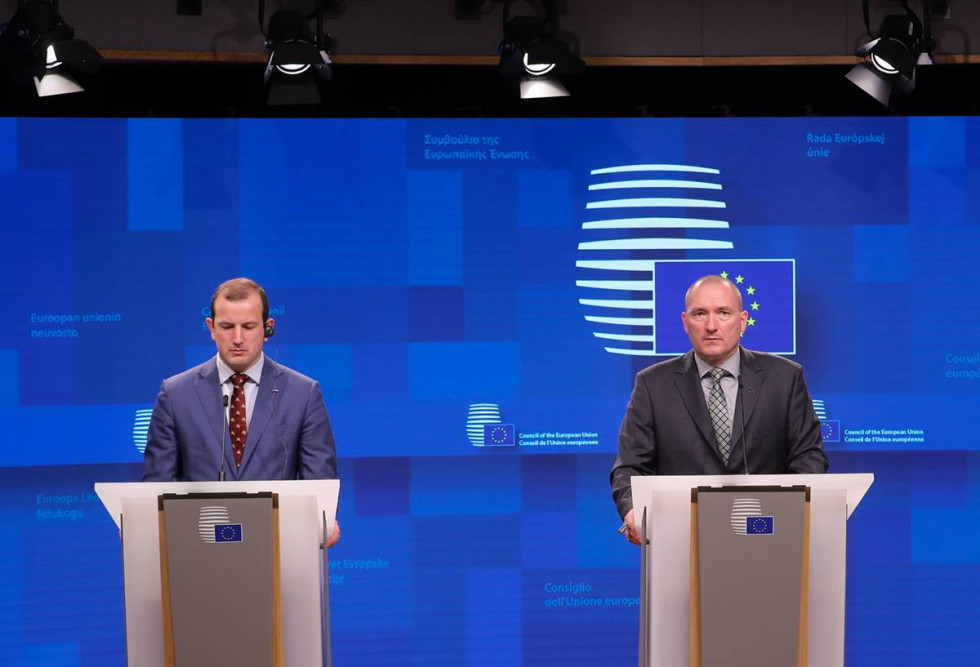By: UKOM
Yesterday, EU fisheries ministers held the last meeting of the Agriculture and Fisheries Council in Brussels.They successfully concluded difficult negotiations on fishing quotas for next year. The Council meeting was chaired for the last time by the Slovenian Minister of Agriculture, Forestry and Food, Jože Podgoršek.
On the agenda of the Agriculture and Fisheries Council, the Slovenian Presidency included an item on the Council Regulation fixing for 2022 the fishing opportunities in EU and non-EU waters and the Council Regulation on fishing opportunities in the Mediterranean and Black Sea for 2022 with a view to reaching a political agreement.
“Today’s agreement is the result of hard work and goodwill on all sides. It will allow us to maintain fish stocks at sustainable levels, while also protecting the livelihoods of European fishing fleets,” said Minister Podgoršek.
The proposal for a Council Regulation fixing the fishing opportunities in EU and non-EU waters is usually adopted in December each year by the Agriculture and Fisheries Council and enters into force the following year, so that EU fishers can start the fishing season in time. Catch limits are set for the following year for most commercial fish stocks, together with national quotas or catch limits for the fish stocks concerned. The stocks concerned are those the EU manages on its own, jointly with neighbouring non-EU countries, or via agreements reached under the regional fisheries management organisations (RFMOs).
The Council’s decision is based on a proposal drawn up by the European Commission, taking into account the best available scientific advice, the aims of the common fisheries policy (CFP) and the maximum sustainable yield (MSY) set for each fish stock. In this way, the fundamental objective of the common fisheries policy is pursued, namely the conservation and sustainable management of fisheries stocks.
Ministers also discussed the fishing opportunities for 2022 in the Atlantic, North Sea, Mediterranean and Black Sea. As part of the fisheries items, ministers held a discussion on the Presidency’s report on the revision of the Fisheries Control Regulation and the Commission’s information on the European Maritime, Fisheries and Aquaculture Fund (EMFAF). Trilateral negotiations on fishing opportunities took place in parallel to the main meeting.
The Slovenian Presidency sought to reach a political agreement on the regulation proposal, which is also linked to the negotiations on fishing opportunities for 2022 with the United Kingdom.
As negotiations on fishing opportunities with the UK were not yet concluded during the Agriculture and Fisheries Council, provisional fishing opportunities, in accordance with the EU-UK Trade and Cooperation Agreement (TCA), were included in the proposal for a Council Regulation on fixing for 2022 the fishing opportunities in EU and non-EU waters, which will enable European fishers to start the fishing season in time next year.
The fixing of fishing opportunities represents an annual management cycle. However, this does not stand in the way of the introduction of long-term management approaches. The European Parliament and the Council adopted, among other things, multiannual plans for the North Sea and Western Waters, which were taken into account by the Council when fixing the fishing opportunities for 2022.
The proposed measures are designed in line with the objectives and rules of the common fisheries policy (CFP) and are consistent with the EU’s policy on sustainable development. In this respect, Council Regulation (EU) No 1380/2013 of the European Parliament and of the Council on the Common Fisheries Policy sets targets for annual proposals for catch and effort limits to ensure that fishing activities are ecologically, economically and socially sustainable.
The objective of the fishing opportunities regulations is to fix fishing opportunities and associated conditions for 2022 in EU waters and other waters where catch limits are required. The main elements of the proposal on fishing opportunities for fishing in EU and non-EU waters are the total allowable catches (TACs) for individual stocks to be distributed as corresponding quotas for member states, fishing effort limits and conditions functionally linked to the fishing opportunities, such as closed areas or closure periods.
The Council reached a political agreement unanimously on the regulation fixing the total allowable catches and quotas providing for fishing opportunities for 2022 in the Atlantic and North Sea.
The Council reached a political agreement on the regulation concerning certain fish stocks and groups of fish stocks applicable in the Mediterranean and Black Sea.
Source: gov.si

